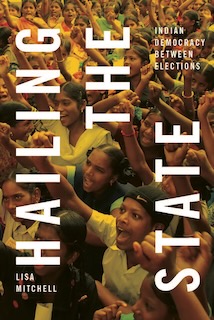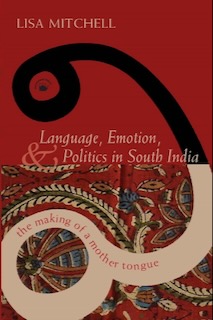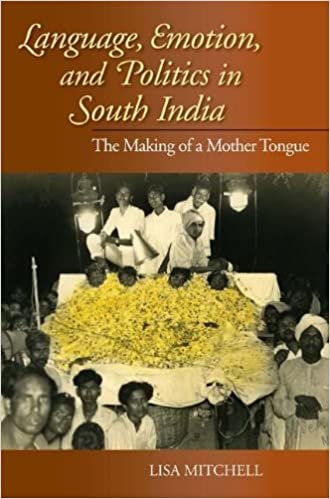
Professor
Education
Bio
Lisa Mitchell is Professor of anthropology & history in the Department of South Asia Studies at the University of Pennsylvania. She is the author of Hailing the State: Indian Democracy between Elections (Duke University Press, 2023), and Language, Emotion, and Politics in South India: The Making of a Mother Tongue (Indiana University Press, 2009 and Permanent Black, 2010), which was recipient of the American Institute of Indian Studies’ Edward Cameron Dimock, Jr. Prize in the Indian Humanities. She is currently working on two new projects, one on The Government Job in India and the second on translations of transnationally circulating political ideas, provisionally entitled, The Multiple Genealogies of Indian Democracy: Global Intellectual History in Translation. She received her PhD in sociocultural anthropology from Columbia University, and has previously taught history at Queens College (CUNY), Bowdoin College, and the University of Washington, and anthropology at the University of Notre Dame. She has been the recipient of fellowships from the National Endowment for the Humanities, Wenner-Gren Foundation, Fulbright-Nehru and Fulbright-Hays programs, Mellon Foundation, the European Research Council, and the American Institute for Indian Studies, and has been a Visiting Fellow at the University of Cambridge (2014-2015), a Mercator Visiting Fellow in Global Intellectual History at the Freie Universität in Berlin (2018), and a Senior Research Fellow at the Max Planck Institute for Social Anthropology in Halle (January-July 2022). In 2020 she was a recipient of the Lindback Award for Distinguished Teaching at the University of Pennsylvania.
Research Interests
Lisa Mitchell's current research interests include the government job in India; translations of transnationally-circulating political ideas and practices; the multiple genealogies of democracy in India; Indian democracy between elections; and the street and the railway station as spaces of political communication. Her research centers on the Telugu-speaking regions of southern India, including Telangana and Andhra Pradesh. Earlier research traced the rise and fall of language as a new foundational category for the reorganization of literary production, history-writing, pedagogical practices, and assertions of socio-political identity in southern India. Additional teaching interests include intellectual and conceptual histories of South Asia in global context; the city and the built environment in South Asia; urban credit networks; and commodities in transnational history.
Selected Publications
Books
2023. Hailing the State: Indian Democracy between Elections, Durham: Duke University Press. (South Asian edition, Ranikhet: Permanent Black, 2023)
2009. Language, Emotion, and Politics in South India: The Making of a Mother Tongue, Bloomington: Indiana University Press. Recipient of the Edward Cameron Dimock, Jr. Prize in the Indian Humanities, American Institute of Indian Studies. (South Asia edition, Ranikhet: Permanent Black, 2010)
Articles
2024. "The Concept of the Political in India," Contributions to the History of Concepts 19(2): 89-117.
2024. “Expanding Domains: Interactions between Telugu and German Worlds,” in Razak Khan and Martin Christof-Füchsle, Eds., Nodes of Translation: Intellectual History between Modern India and Germany, Berlin: De Gruyter, pp. 267-292.
2023. “The Railways and the City in the History of Indian Political Practice,” in Ralf Roth and Paul Van Heesvelde, Eds., The City and the Railway in the World from the Nineteenth Century to the Present, New York: Routledge, pp. 229-240.
2021. “Other Places, Other Times: Brokerage in History and Practice,” in Lisa Björkman, ed., Bombay Brokers, Durham: Duke University Press, pp. 414-424.
2021. “Whose Emotions? Boundaries and Boundary Markers in the Representation of Emotions,” in Margrit Pernau, ed., “Emotions in South Asia,” South Asian History and Culture 12: 2-3, pp. 345-355.
2019. “Participatory and Adversarial Politics: Representing Speech Action, Collective Action and Emotion,” Ch. 3, in Amelie Blom and Stephanie Tawa Lama-Rewal, Eds., Emotions, Mobilisations, and South Asian Politics, London: Routledge India, pp. 46-67.
2019 (with Walter Hakala). “South Asia from c. 1750,” in John Considine, ed., The Cambridge World History of Lexicography, Cambridge: Cambridge University Press, pp. 388-413.
2019. “Language Regimes and Corporeal Practices of “Making Known”: Speech Action, Collective Assembly, and the Politics of Recognition in India,” Special Issue on “Regimes of Language and the Social, Hierarchized Organization of Ideologies,” Language and Communication 66: 41-54.
2018. “Civility and Collective Action: Soft Speech, Loud Roars, and the Politics of Recognition,” in Sharika Thiranagama, Tobias Kelly, and Carlos Forment, eds., Special Issue on Civility, Anthropological Theory 18(2-3): 217-247.
2018. “Spaces of Collective Representation: Urban Growth, Democracy, and Political Inclusion,” White Paper Series for World Urban Forum, University of Pennsylvania.
2015. “The Visual Turn in Political Anthropology and the Mediation of Political Practice in Contemporary India,” The Visual Turn: South Asia Across the Disciplines, Sandria Freitag, ed., Routledge.
2014. “The Visual Turn in Political Anthropology and the Mediation of Political Practice in Contemporary India,” South Asia: Journal of South Asian Studies, 37(3): 515-540.
2013. Translation of Challapalli Swaroopa Rani, “Caste Domination Male Domination,” in K. Satyanarayana & Susie Tharu, eds., Steel Nibs are Sprouting: New Dalit Writing From South India, Dossier II: Kannada and Telugu, Harper Collins India (translated from Telugu), pp. 704-709.
2013. Translation of “The Madman's Footprint,” by Siva Sagar, translated with R.V.S. Sundaram, Mango Bites, vaakali.com/patrika, February 13, 2013 (translated from Telugu).
2011. “‘To Stop Train Pull Chain’: Writing Histories of Contemporary Political Practice,” Indian Economic and Social History Review, Vol. 48, No. 4: 469-495.
2009. “Knowing the Deccan: Enquires, Points, and Poets in the Construction of Knowledge and Power in Early Nineteenth-Century Southern India,” The Madras School of Orientalism, Thomas R. Trautmann, ed., Delhi: Oxford University Press, pp. 151-182.
2009. “Knowledge at the Edge of Empire: Experiencing Colonialism and Its Forms of Knowledge,” Fringes of Empire, Elizabeth Kolsky & Sameetah Agha, eds., Delhi: Oxford University Press, 236-256.
2006. “Making the Local Foreign: Shared Language and History in Southern India,” Journal of Linguistic Anthropology, Vol. 16, No. 2: 229-248.
2005. “Parallel Languages, Parallel Cultures: Language as the Foundation for the Reorganization of Knowledge and Practice in Nineteenth Century Southern India,” Indian Economic and Social History Review, Vol. 42, No. 4: 445-467.
2005 (with Rama Sundari Mantena and Bernard Bate). “Introduction: Language, Genre, and Historical Imagination in South India,” Indian Economic and Social History Review, Vol. 42, No. 4: 443-444.
Courses Taught
SAST 002 (ANTH 107/URBS 122) - The City in South Asia
SAST 058 (ANTH 058) - Doing Research: Qualitative Methods and Research Design (First-Year Seminar)
SAST 063 (ANTH 063/HIST 087) - East & West: A Hitchhiker's Guide to the Cultural History of the Modern World
SAST 166 - Democracy in India and South Asia
SAST 208 (ANTH 201/SAST 508) - Doing Research
SAST 604 (ANTH 503/URBS 504) - Neoliberalism and the City
SAST 629 (ANTH 629) - Money, Markets, and Mutuality: Ethnographic Approaches to Credit, Creditworthiness, and Other Intersections of the Fiscal and the Social
SAST 701 (HIST 702/ANTH 711) - Historical Anthropology
SAST 704 (ANTH 706) - State, Society, & Culture in South Asia
SAST 7307 (ANTH 7307) - Intellectual and Conceptual Histories of South Asia in Global Context
Affiliations
Member of the Graduate Groups in South Asia Studies, Anthropology, and History (in the School of Arts and Sciences) and City and Regional Planning (in the Weitzman School of Design)

 South Asia Studies
South Asia Studies


